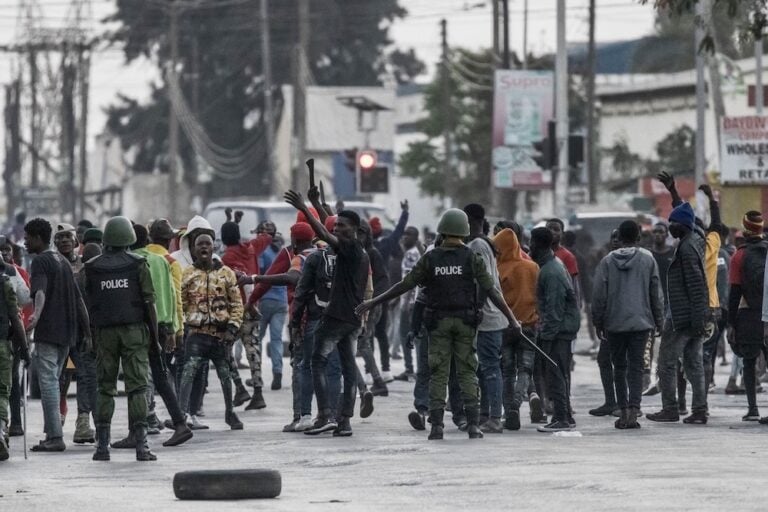(MISA/IFEX) – The ruling Movement for Multi-party Democracy (MMD) has obtained an injunction restraining the “Post” newspaper from any further publication of articles concerning the security of Zambia and the country’s stand-off with Angola. **Updates IFEX alerts of 25 March, 22 March, 19 March, 18 March, 17 March, 15 March, 12 March, 11 March and […]
(MISA/IFEX) – The ruling Movement for Multi-party Democracy (MMD) has
obtained an injunction restraining the “Post” newspaper from any further
publication of articles concerning the security of Zambia and the country’s
stand-off with Angola.
**Updates IFEX alerts of 25 March, 22 March, 19 March, 18 March, 17 March,
15 March, 12 March, 11 March and 10 March 1999**
The “Post” reported on 25 March 1999 that the injunction, the summons of
which was dated 18 March, was brought by MMD Kabwata constituency
chairperson Richard Kachingwe and twenty other ruling party cadres along
with the Attorney General.
The case was adjourned to 29 April after High Court judge Martin Imasiku
said he could not proceed with the case because an affidavit of service had
not been filed.
In the affidavit of summons for the injunction, the plaintiffs claimed the
defendants, the “Post” and its editor-in-chief Fred M’membe, had published
and were likely to continue publishing matters injurious to the security of
the Zambian nation and the safety of the plaintiffs. The affidavit said that
unless the defendants were restrained from further publication of matters
injurious to the security of Zambia, further irreparable damage would be
caused to the Zambian nation and consequently to the plaintiffs. The
affidavit added that in the lead story of the 9 March edition of the “Post”,
the defendants had maliciously, and with deliberate intent to injure the
security of the defendants, published top secret statistics about the
Zambian defence force. It further said that the plaintiffs had in
consequence suffered serious loss and damage as their security had a direct
relationship with secrecy.
Background Information
Nine “Post” journalists, including editor-in-chief Fred M’membe, were by 22
March all charged with espionage as a result of the lead story which
appeared in the newspaper on 9 March. The eight others charged were:
Brighton Phiri, Kelvin Shimo, Joe Kaunda, Amos Malupenga, Lubasi Katunda,
Goodson Machona, Douglas Hapande and MacPherson Muyumba. All of them are
expected to appear in court on 16 April.
The charging of the nine journalists was preceded by an unprecedented
crackdown on the paper which began on 9 March. Six reporters were arrested
on 9 and 10 March, apparently after an order for the police to arrest all
“Post” journalists before dawn on 10 March. Police tried to arrest more
journalists, but the journalists managed to evade them.
The arrest of the reporters on 9 March was coupled with a siege of the
“Post” editorial offices and its separately located printing press,
resulting in a delay of several hours in the printing of the paper. On 10
March, police surrounded the two buildings, prevented anyone from entering
or leaving, and also cut the power and water supply. On 11 March, the “Post”
failed to appear on the streets of Lusaka as scheduled, the first time this
had happened in its seven-year history. Those trapped in the building
housing the printing press managed to print the paper, but the police
prevented it from being distributed. The 11 March edition of the paper was
eventually sold openly on the streets of Lusaka on the next day.
The contentious story which sparked the crackdown questioned the military
capacity of Zambia to withstand an incursion from neighbouring Angola. The
article can be read on the Internet at:
http://www.zamnet.zm/zamnet/post.arch.20742/news/fpstory.html
In a statement on 19 March, the International Federation of Journalists
(IFJ) expressed concern about the charges laid against the “Post”
journalists. According to the IFJ, the article in question did not warrant
charges of espionage being brought against the journalists.
Recommended Action
Send appeals to the President:
blocking of the circulation of “The Post” after the “offending” article had
appeared
action suggests that they were using the appearance of the article as an
excuse to shut down “The Post”, an action which they have failed to fulfill
in the past despite various suits and attacks against the paper
Appeals To
Frederick Chiluba
President of the Republic of Zambia
State House
Lusaka, Zambia
Fax: +260 1 221939
E-mail: state@zamnet.zm / mfalus@zamnet.zm
Please copy appeals to the source if possible.


